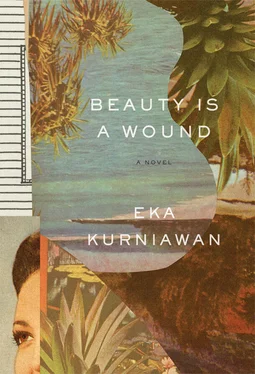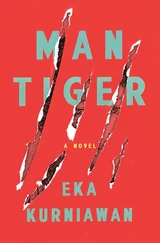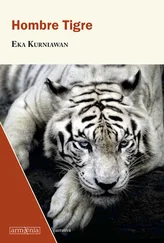But it wasn’t like burying a corpse — it was more like burying a turd after taking a shit in the banana orchard.
The massacre continued into a second night, and a third, and then a fourth night, a fifth, and a sixth and seventh. The operation was carried out swiftly, almost finishing off the entire supply of thugs in Halimunda. But Shodancho was not in the least bit satisfied, because Maman Gendeng was not among the corpses.
For that entire week, Maman Gendeng did not return home. Maya Dewi was very worried about him, especially after she heard that the city thugs were being killed off one by one, for seven nights straight, all shot to death, in the head or the chest. Although no one knew for sure, everyone could guess who had done it, because only certain people carried weapons. So Maya Dewi went to find Shodancho.
“Have you murdered my husband?”
“Not yet,” Shodancho replied sadly, “ask those soldiers.”
She asked them one by one, almost every single soldier, and they replied just as Shodancho had replied:
“Not yet.”
But she didn’t really believe them. Shodancho had banished Comrade Kliwon to Buru Island, so he could certainly kill her husband Maman Gendeng. She hoped that her husband truly was invincible, but seeing so many corpses in the street, she could not stop herself from keeping up her search, because maybe one of the bodies was his.
So that beautiful woman, with a red headscarf protecting her from the bright sunlight, began to go from one sack to the next, and one by one she loosened their cords — unmoved by the rotting stench that violated her nose, not caring that she was competing with the flies — and examined the corpses inside, comparing their faces to her beloved memory of her husband’s face. Not one of the corpses was Maman Gendeng, but she recognized most of them as her husband’s loyal friends, and so she felt sure that her husband had died as well. Maybe all that talk of invincibility had just been hot air. She had to find him, and if indeed he was already dead, she would have to bury him in an honorable manner.
In order to find out about those corpses that had already been buried by the people who couldn’t stand their smell, she approached a group of amateur gravediggers and asked whether they had buried her husband.
“From the smell we don’t think so.”
“What do you think my husband smells like?”
“Well, he must smell much worse than all these other thugs, because he was the biggest thug of them all.” Maya Dewi acknowledged the truth in those words, and continued her search. She chased after a couple of corpses that were floating in the river and getting swept away by the current, but after she had worn herself out catching them, it turned out that neither one was her husband. She also examined the corpses scattered along the beach, a sight that had scared all the tourists away from Halimunda. But after a whole day, her hard work was still in vain and she returned home as night fell, hoping there would be no more slaughter that evening, and that her husband would return. Her wish was not granted, and when morning came she began her search again, opening all the sacks she hadn’t tried yet.
She kept on this way until finally a couple of people told her that they had seen Romeo and her husband escape into the jungle on the cape on the seventh day of the massacre. But the soldiers had heard about this too, so she was in a race against time, hoping that they had not been able to shoot him yet. She went into the jungle alone, wearing only flip-flops on her feet, and protected by the same red headscarf she had been wearing the day before, stumbling along a footpath that was grown over with shrub brush. That jungle had been a protected forest since the colonial era, and it wasn’t inhabited just by monkeys and wild pigs, but also by wild buffalo and even jaguars, but Maya Dewi was not afraid of anything. All she wanted was to find her husband, dead or alive.
She passed by a group of four soldiers, and she stopped them.
“Have you killed my husband?”
“This time yes we have, Madam,” said their leader, “and we extend our condolences.”
“Where did you put his corpse?”
“Go straight for about a hundred meters, and there you will find his body, already surrounded by flies. We crucified him on a mango tree first.”
“Is he in a sack?”
“In a sack,” replied the soldier, “curled up like a baby.”
“See you later.”
“Later.”
Maya Dewi continued on her way, walking straight for a hundred meters, just as the soldier had told her to do, and there she did in fact see a sack, already lined with flies. The carrion-eating buzzards were already pecking at it, and two ajak had been tearing at its corners. Maya Dewi chased them all away, opened the cord around the sack, and made sure the person “curled up like a baby” inside was that man, her husband, and even though his face was almost unrecognizable, it was indeed him. She didn’t cry, not then in any case. With impressive composure, she tied the sack back up with its plastic cord. And because she was not strong enough to carry him on her back, she dragged the sack the whole way from where she had found him to the Budi Dharma public cemetery, where she asked that her husband be buried in an honorable manner. The flies besieged his sack for the entire journey, stretching out behind her like a comet’s tail.
The insects only dispersed once Kamino had bathed and perfumed the man. Now the corpse was lying stiffly, with bullet wounds visible in his forehead and his chest, just two shots that must have killed him instantly. The wound on his chest was right at his heart. It was only when she saw this that Maya Dewi wept, and to spare her further grief, Kamino quickly wrapped him up in a burial shroud. He recited the prayer for the dead, along with Kinkin, who paid his respects to the man who should have been his father-in-law. Maman Gendeng’s body was buried right next to the grave of his daughter, and Maya Dewi knelt for almost an hour there in between those two graves, feeling abandoned, alienated, and alone. She began her days of mourning, and on the third day Maman Gendeng returned from the afterlife.
As had already been proven, that man truly was invincible. He wasn’t afraid of the massacre. But he couldn’t stand to see his friends lying dead in the streets and said to Romeo, who was faithfully following him:
“Let’s run away into the jungle.”
They went on the seventh day of the massacre, after moving from one hiding place to the next. It was true: that city no longer pleased the preman . He couldn’t bear to remember all of his pride over his strength and invulnerability while his friends lay dead at his feet.
“Soon they will become ghosts, and if we survive, we will suffer to see their suffering,” he said during their escape, remembering the last days of Comrade Kliwon’s life, when that man had been beaten down by an ever-deepening grief to see the ghosts of his friends in a condition of such grave suffering. Living like that was much too painful, and Maman Gendeng wanted to avoid it.
“There’s no way we can run from ghosts,” said Romeo.
“That’s true, unless we join them, just as Comrade Kliwon finally chose to kill himself.”
“I’m not brave enough to kill myself,” said Romeo.
“I don’t want to either,” said the criminal. “I’m still trying to think of some other solution.”
He chose to escape to the jungle on the cape because it was almost completely deserted. It was a protected forest, and because of that there were no farmers working the land, just a few lazy forestry officers. He hoped that by escaping there, he could buy some time before being discovered by the soldiers, who might not be able to kill him, but would nevertheless be deeply annoying. He was trying to make a decision.
Читать дальше











